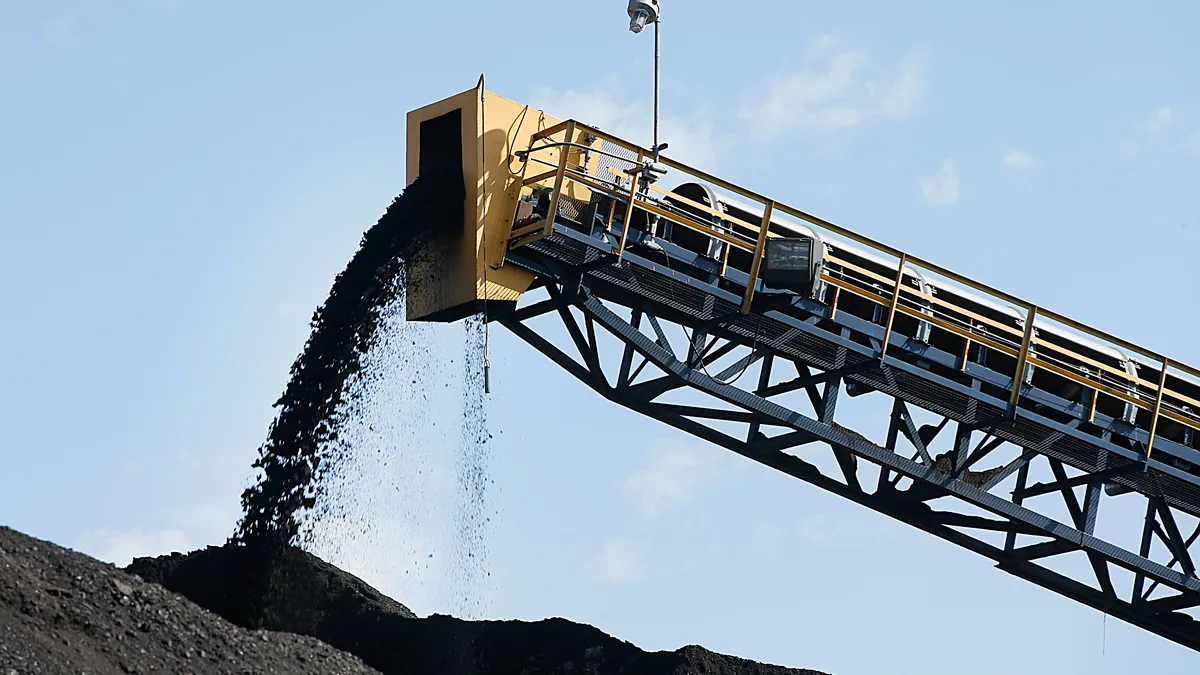Dive Brief:
- Texas Attorney General Ken Paxton is leading a lawsuit against BlackRock, Vanguard and State Street in federal court, alleging they are “conspiring to artificially constrict” the coal market, according to a Wednesday press release.
- Paxton and Texas were joined by 10 other Republican-led states in the lawsuit accusing the three largest U.S. asset managers of buying “substantial” holdings in public coal companies and then pushing those companies to reduce their output, according to the Nov. 27 lawsuit.
- While Paxton said in the release that the three firms “have formed a cartel to rig the coal market,” both State Street and BlackRock called the lawsuit “baseless” in separate statements to ESG Dive Monday.
Dive Insight:
Paxton and the coalition filed the complaint in the U.S. Eastern District Court of Texas and “demanded” a jury trial, according to the filing. Texas was joined in the suit by Alabama, Arkansas, Indiana, Iowa, Kansas, Missouri, Montana, Nebraska, West Virginia and Wyoming. The lawsuit alleges the three asset managers allegedly violated the Sherman Act and Clayton Act — which govern antitrust law — as well as state antitrust laws from Texas, Montana and West Virginia.
The states noted that the three firms’ combined individual holdings in public coal producing companies, amounts to collective influence. Additionally it noted memberships — past and present — to climate coalitions Climate Action 100+ and the Net Zero Asset Managers initiative and their requisite emissions reductions commitments. The lawsuit said taken together, the collective holdings, membership commitments and influence from the three firms “pose a substantial threat to competition in the relevant markets.”
State Street departed CA100+ in February, and BlackRock transferred its membership to an international arm of the business around the same time. Vanguard was never a CA100+ member, but all three companies were NZAM members before Vanguard withdrew in 2022.
“For the past four years, America’s coal producers have been responding not to the price signals of the free market, but to the commands of Larry Fink, BlackRock’s Chairman and CEO, and his fellow asset managers,” the lawsuit said. “As demand for the electricity Americans need to heat their homes and power their businesses has gone up, the supply of the coal used to generate that electricity has been artificially depressed — and the price has skyrocketed.”
The lawsuit said that collectively, the three asset managers own more than 30% of outstanding stocks in Peabody Energy and Arch Resources which are responsible for 17% and 13% of U.S. coal production. The three individually own between 15% and 6.4% of Arch Resources shares and between 5% and 13.6% of Peabody Energy shares. The lawsuit alleged the firms are using the influence gained through the stock holdings to pressure coal companies to reduce output, in alignment with the asset managers’ net-zero goals.
The states alleged that engaging with the companies to get them to reduce their greenhouse gas emissions pressured the companies, and the subsequent output reductions and climate disclosures from the coal companies was a result of that pressure.
Both State Street and BlackRock pushed back against the lawsuit in separate statements Monday.
State Street said in a statement the firm “acts in the long-term financial interests of investors,” and that the firm looks forward “to presenting the facts through the legal process.”
“As long-term capital providers, we have a mutual interest in the long-term success of our portfolio companies,” State Street said Monday. “This lawsuit is baseless.”
For their part, BlackRock said in a statement that it is “deeply invested in Texas’ success.” The firm noted that its holdings in energy companies are “regularly reviewed by federal and state regulators.”
“The suggestion that BlackRock has invested money in companies with the goal of harming those companies is baseless and defies common sense,” the firm said. “This lawsuit undermines Texas' pro-business reputation and discourages investments in the companies consumers rely on.”
Texas and a similar group of Republican attorneys general have made BlackRock a top target of various anti-ESG actions. That included the state’s Permanent School Fund pulling more than $8.5 billion from the firm earlier this year.
The three asset managers, as well as more CA100+ and members of other climate coalitions were also accused of forming a “climate cartel” and “colluding on decarbonization” in an interim report from the House Judiciary Committee, which has conducted a years long probe into whether such climate coalitions could potentially run afoul of antitrust rules. Witnesses then refuted such claims in a hearing called to discuss its findings.
Vanguard did not immediately respond to requests for comment.
Clarification: This story was updated to clarify Vanguard's NZAM membership status.











